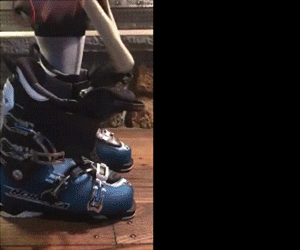Gidget415
Certified Ski Diva
I moved to NM from the East Coast years ago and now live at 6400 ft and ski at 10k plus, so I'm fine with it now but I still feel altitude at times. Everyone above has great suggestions.
Definitely remember to hydrate. I saw some great hydration bottles at Taos last week that collapsed flat in your jacket and then pop up as you fill them on breaks. I am going to look for them online for the family. Eating soups for lunch, etc., and hot herbal teas are a great way to sneak in extra fluids.
Listen to your body, and if you are feeling tired, it could be the altitude and it may be a good idea to end the day early until you adjust. You don't want to get an injury because you normally can ski all day at lower elevations and you want to push. There are days when I'm skiing out here and go to bed by 8pm or earlier because that's what I need that day, it's a function of the conditions up here and you won't regret it.
Definitely pack sunscreen (and reapply), lip balm with SPF, and a gentle moisturizer (wind burn + our sun can make the chemicals really burn). Be careful about humidifiers in hotel rooms, because they can have mold built up. I sometimes take a small essential oils diffuser, which acts like a small packable humidifier and use a little lavender in it or one of the oil blends that help you breathe (one is actually called "breathe" and it sells on Amazon I think).
Yes, we don't have the same ice out here on our runs, but you may find some real ice on bumps that warm up a bit in the afternoon and freeze overnight. You may also like to demo some powder or all mountain skis if you don't have those. Enjoy!
Definitely remember to hydrate. I saw some great hydration bottles at Taos last week that collapsed flat in your jacket and then pop up as you fill them on breaks. I am going to look for them online for the family. Eating soups for lunch, etc., and hot herbal teas are a great way to sneak in extra fluids.
Listen to your body, and if you are feeling tired, it could be the altitude and it may be a good idea to end the day early until you adjust. You don't want to get an injury because you normally can ski all day at lower elevations and you want to push. There are days when I'm skiing out here and go to bed by 8pm or earlier because that's what I need that day, it's a function of the conditions up here and you won't regret it.
Definitely pack sunscreen (and reapply), lip balm with SPF, and a gentle moisturizer (wind burn + our sun can make the chemicals really burn). Be careful about humidifiers in hotel rooms, because they can have mold built up. I sometimes take a small essential oils diffuser, which acts like a small packable humidifier and use a little lavender in it or one of the oil blends that help you breathe (one is actually called "breathe" and it sells on Amazon I think).
Yes, we don't have the same ice out here on our runs, but you may find some real ice on bumps that warm up a bit in the afternoon and freeze overnight. You may also like to demo some powder or all mountain skis if you don't have those. Enjoy!

